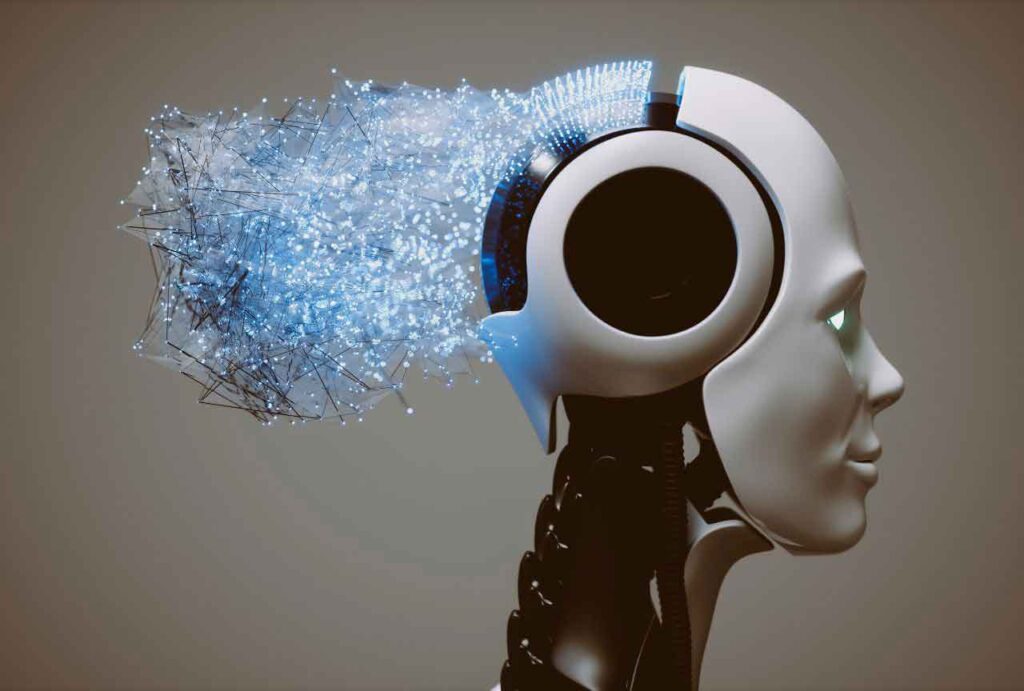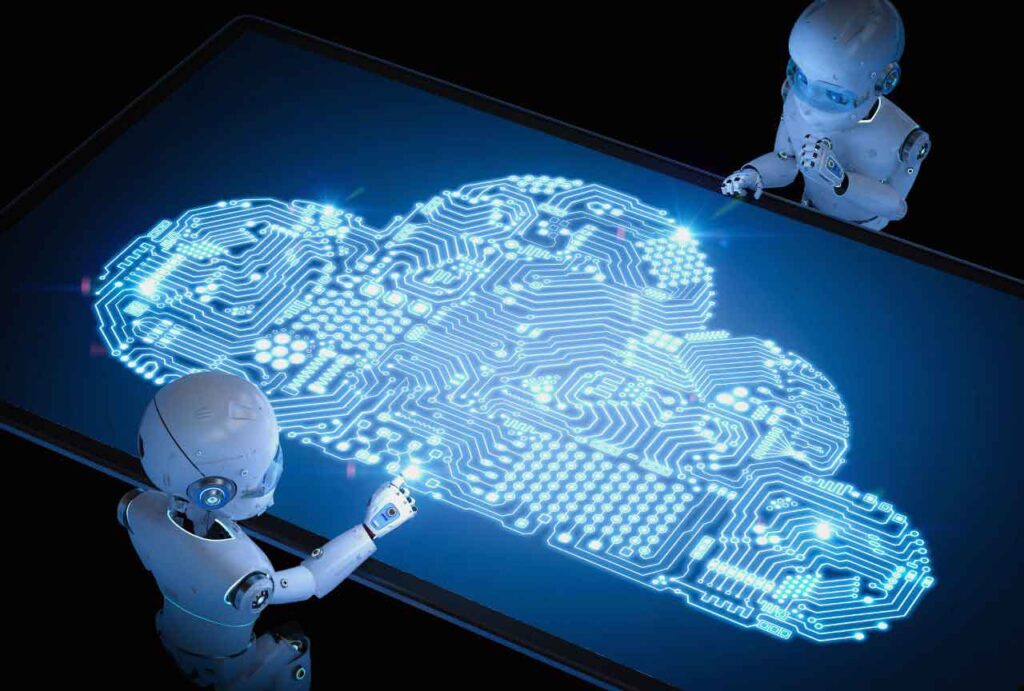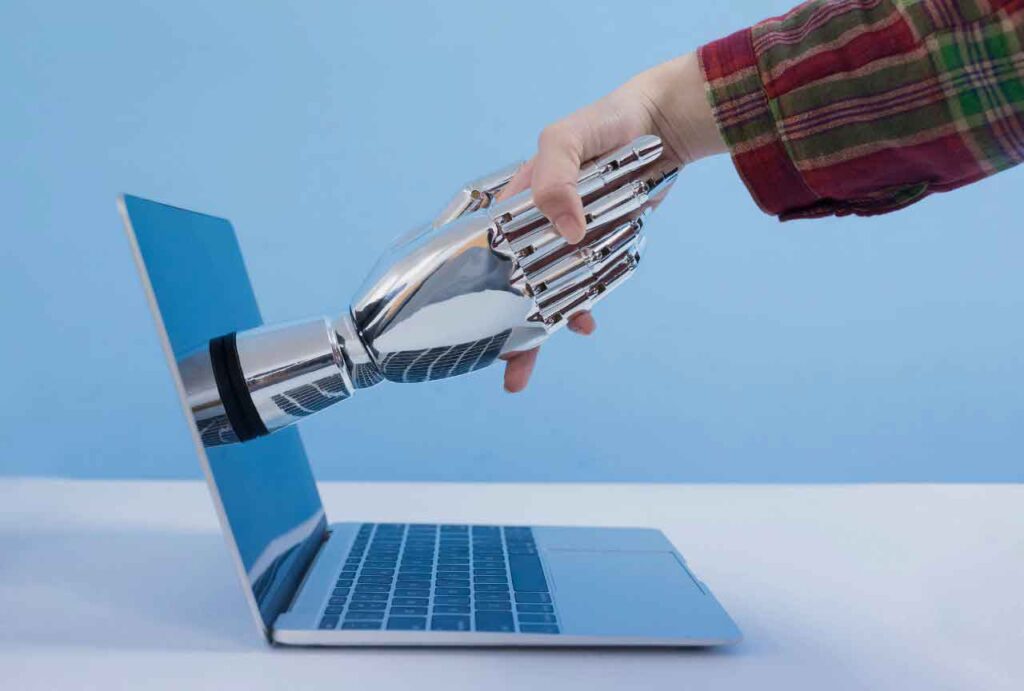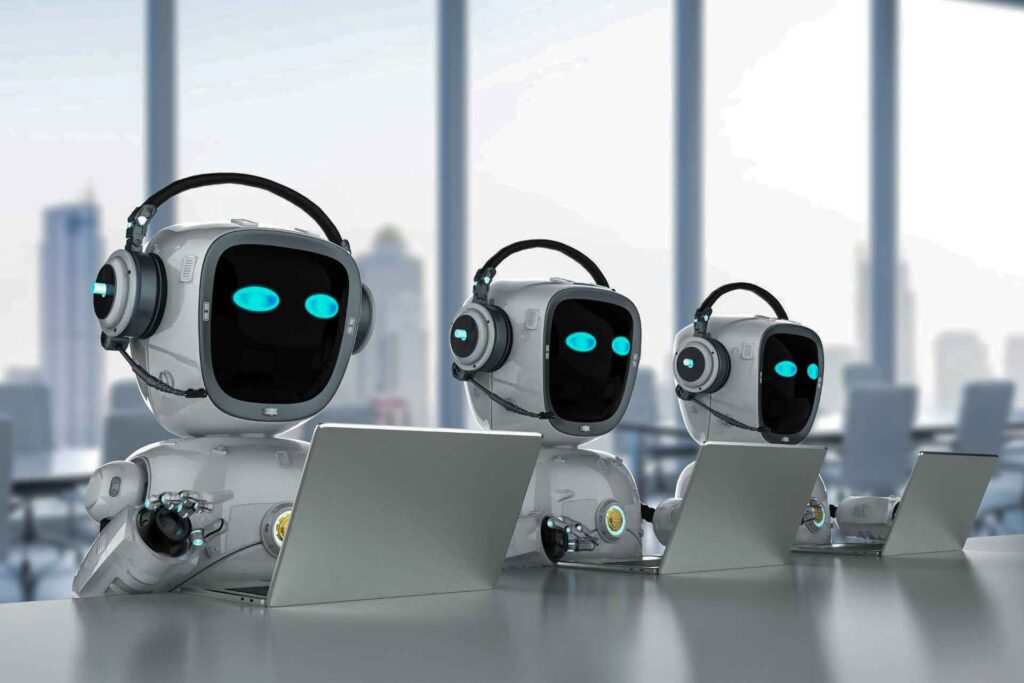The AI revolution isn’t coming, it’s here, and headlines scream that AI is replacing humans. The rise of artificial intelligence isn’t a storm on the horizon, it’s the tide already lapping at our shores. For many, it begs a poignant question: will my career become obsolete, swept away by the digital wave?
While the landscape is undoubtedly shifting, a crucial truth needs to be grasped: AI isn’t an executioner, it’s an evolution. A metamorphosis of the workplace, reshaping the rules of the game, but not the game itself. And in this new arena, if humans knew how to, they could still hold the winning hand.
Well, this article is a beacon for those standing at the intersection of human expertise and AI innovation, facing the common anxiety of potential displacement. So let’s explore strategies that not only shield us from the uncertainties but empower us to architect a future where we not try to survive the AI, but to thrive alongside it.
I. Understanding AI’s Role in the Workplace:
Understanding AI’s role in the modern workplace isn’t about deciphering a binary code. It’s about mastering a complex and evolving tango between human expertise and digital augmentation. To truly thrive in this dance, we need a nuanced understanding of AI’s multifaceted influence, not just as a technological abstraction, but as a force fundamentally reshaping the landscape of work.
A. Overview of AI Technologies and Applications:
AI isn’t some monolithic beast lurking in the shadows. It’s a vibrant ecosystem of technologies, each with its own unique abilities and potential applications. Let’s peel back the jargon and shed light on the core players in this AI orchestra:
- Machine Learning: Imagine machines that learn from data, constantly refining their abilities. That’s the essence of machine learning, where algorithms sift through vast datasets. To uncover patterns and make predictions that enhance tasks like personalized recommendations or fraud detection.
- Natural Language Processing: What if a computer understands and converse like a human. Natural language processing breathes life into machines, enabling them to interpret our words, extract meaning, and even generate human-like text. This opens doors to chatbots that seamlessly answer customer queries or AI-powered writing tools that analyze and refine your prose.
- Robotics: Modern robotics is ushering in a new era of intelligent machines capable of intricate tasks and dynamic collaboration. From surgical robots assisting doctors with precision to drones inspecting remote infrastructure. These versatile tools blur the line between human and machine capabilities.

B. AI in Action: Transforming Industries from the Inside Out
The impact of AI isn’t confined to theoretical possibilities. It’s already revolutionizing diverse industries, leaving tangible footprints in the real world:
- Healthcare: Imagine AI algorithms analyzing medical scans with superhuman accuracy, predicting disease outbreaks, or even tailoring personalized treatment plans. This is the future of healthcare, where AI assists doctors in making critical decisions and saving lives.
- Finance: AI can analyze market trends in real-time, detects fraudulent activity before it happens, or even manages investment portfolios with an unparalleled level of precision. This is the reality of AI in finance, streamlining processes, mitigating risk, and unlocking new avenues for wealth creation.
- Manufacturing: Forget assembly lines manned by repetitive robots. Modern AI empowers factories with predictive maintenance, optimizing production processes, and even collaborating with human workers to ensure product quality and efficiency.
C. Recognizing the Evolution of Job Roles Due to AI Integration:
- Augmentation: Not all jobs are replaced by AI; many are augmented. Imagine data analysts leveraging AI tools to sift through mountains of data, freeing up their time for higher-level analysis. This collaboration enhances human capabilities, creating more productive and impactful work.
- Evolution: Some job descriptions morph in the face of AI. Take marketing, where AI might handle routine tasks like ad targeting while human creativity still shapes campaigns and connects with audiences on an emotional level.
- Emergence: AI integration also paves the way for entirely new roles. Cybersecurity specialists trained to counter increasingly sophisticated AI threats, or AI ethicists ensuring responsible development and application of these technologies, are just two examples of jobs born from this digital tango.
II. The type of tasks and skills that AI Excels:
While humans shine in creativity, empathy, and critical thinking, AI possesses its own set of dazzling skills, perfectly suited for specific tasks within the modern workplace. Let’s look at the types of tasks where AI truly excels, leaving us humans free to focus on our unique strengths.
1. Data:
Think of AI as a tireless data analyst on steroids. Its algorithms can crunch through mountains of information at superhuman speed, uncovering hidden patterns, correlations, and insights that would elude even the most dedicated human team. This makes AI a master of:
- Predictive Analysis: From forecasting market trends to anticipating equipment failures, AI can analyze historical data and identify patterns to predict future outcomes with remarkable accuracy. This empowers businesses to make informed decisions, optimize their operations, and stay ahead of the curve.
- Personalized Recommendations: Whether it’s suggesting the perfect product for an online shopper or tailoring a learning experience for a student, AI can analyze individual data points and deliver highly personalized recommendations that enhance user engagement and satisfaction.
- Risk Management: From spotting fraudulent transactions to detecting cybersecurity threats, AI can scan vast datasets in real-time, identifying anomalies and potential risks before they escalate. This proactive approach strengthens security measures and mitigates potential losses.
2. Efficiency:
Repetitive tasks, once the bane of human existence, are AI’s playground. Its algorithms can perform these tasks with high accuracy and speed, freeing up valuable human time and resources for more strategic endeavors. This includes:
- Automation of Repetitive Processes: Whether it’s data entry, scheduling appointments, or generating reports, AI can automate countless repetitive tasks, streamlining workflows, reducing errors, and boosting overall productivity.
- Quality Control and Inspection: Imagine AI robots with eagle eyes, scanning products for defects or inspecting infrastructure with precision. This application of AI ensures consistent quality control, minimizes human error, and improves safety standards.
- Customer Service Chatbots: Ever had a seamless chat with a virtual assistant? That’s AI in action! These chatbots can handle routine inquiries, resolve basic issues, and even gather customer feedback, freeing up human customer service representatives for more complex interactions.
3. The Language:
AI is rapidly bridging the communication gap between humans and machines. Its natural language processing skills enable it to:
- Text Analysis and Summarization: Need to synthesize the key points of a lengthy document? AI can analyze massive amounts of text, extracting the core information and presenting it in a concise and readable format.
- Machine Translation: Breaking down language barriers is no longer a sci-fi dream. AI-powered translation tools can accurately translate text and speech between languages, fostering global communication and collaboration.
- Intelligent Content Creation: From generating personalized marketing copy to writing news articles, AI is venturing into the realm of content creation. While human creativity remains unmatched, AI tools can assist with research, suggest relevant keywords, and even analyze reader engagement for continuous improvement.
4. The Learning Machine:
Unlike static algorithms of the past, modern AI constantly evolves and learns from its experiences. This continuous learning ability makes it adept at:
- Adaptive Decision Making: Imagine algorithms that learn from user feedback and refine their responses over time. This is the power of adaptive decision making, where AI can tailor its actions to specific contexts and user preferences, constantly improving its performance.
- Personalized Learning: Education tailored to individual needs is no longer a pipe dream. AI-powered learning platforms can adapt to each student’s strengths and weaknesses, creating personalized learning paths that optimize knowledge acquisition and engagement.
- Scientific Discovery: From analyzing massive datasets to identifying new drug candidates, AI is accelerating scientific discovery. Its ability to uncover hidden patterns and connections can push the boundaries of our understanding and lead to groundbreaking breakthroughs.
By understanding where AI excels, we can leverage its capabilities to create a more efficient, productive, and ultimately, more collaborative future of work.

Also Read: How to Self-Learn for Career Advancement (Techniques and Strategies)
III. 10 Jobs at high-risk and most vulnerable to AI:
While Artificial intelligence promises exciting opportunities, it’s also reshaping the workplace, raising concerns about potential job displacement. Let’s explore 10 job types particularly vulnerable to AI’s evolution:
1. Content Writing: AI’s mastery of mimicry and data analysis threatens routine content creation like product descriptions or blogs. Its speed and efficiency could replace jobs focused on high-volume, low-complexity writing.
2. Digital Marketing: AI’s data-driven precision optimizes ad targeting and manages campaigns with uncanny accuracy. Potentially outperforming human efforts in routine tasks like bidding strategies and performance reporting.
3. Cashiers: Self-checkout kiosks powered by AI eliminate the need for cashiers in standardized transactions. Streamlining checkout processes and reducing labor costs in high-volume stores.
4. Technical Support: AI-powered chatbots handle basic troubleshooting and FAQs with 24/7 availability. significantly reducing dependence on human teams for routine support inquiries.
5. Data Analysts: AI’s lightning-speed analysis and accurate predictions could replace jobs focused on routine data cleansing, basic analysis, and generating standard reports.
6. Data Entry: AI’s error-free, lightning-fast processing eliminates repetitive data entry tasks like form processing and medical record transcription, rendering such jobs highly susceptible to automation.
7. Assembly Line Workers: Advanced robots and AI-controlled systems automate repetitive assembly tasks with unmatched precision and consistency, potentially replacing human workers in standardized production processes.
8. Financial Analysts: AI’s ability to analyze market trends, assess risks, and even manage investment portfolios with remarkable accuracy poses a significant risk to jobs focused on routine data analysis and basic financial modeling.
9. Taxi Drivers: Autonomous vehicles powered by AI and advanced sensors threaten taxi drivers, particularly in standardized routes and predictable conditions. Widespread adoption could significantly disrupt the industry.
10. Appointment Schedulers: AI-powered scheduling tools integrate with calendars, analyze availability, and schedule appointments with minimal human intervention, automating routine tasks and potentially replacing jobs focused solely on scheduling.
5 Proactive strategies to protect your career from AI:
1. Make AI your friend:
Instead of fearing AI’s takeover, consider embracing it as a powerful ally, a tireless partner, and an extension of your own capabilities. By seeing it as a friend, not a foe, you unlock its potential to supercharge your skills and gain an edge in the evolving workplace.
Just like calculators, you wouldn’t compete with it for speed or accuracy in complex calculations. But you’d leverage its capabilities to solve problems faster, freeing your mind for higher-order thinking and creative problem-solving. Similarly, AI can handle the tedious, repetitive tasks that bog down your workday. This frees you to focus on what truly sets you apart; human skills like empathy, critical thinking, creativity, and the ability to build meaningful relationships.
So familiarize yourself with AI and see how it can improve your skills and capabilities to make you a valuable asset in the workplace rather than replacing you.

2. Specialize in Niche Areas:
While AI excels at crunching numbers and streamlining processes, it lacks the human touch of individuality and the spark of unique expertise. This is where you, the human, shine. In the face of AI’s broad brushstrokes, carve out your niche, a specialized haven where your specific skills and knowledge become invaluable assets.
Remember, while AI can replicate some skills, it can never replicate the depth and nuances of true expertise. This is where your human edge lies. By becoming a master of your chosen niche, you cultivate a depth of knowledge and understanding that AI simply cannot match. As the world becomes increasingly automated, those who can offer specialized, irreplaceable skills will become the currency of the future.
3. Cultivate Irreplaceable Human Skills:
AI isn’t replacing humans; it’s reshaping the landscape. By focusing on honing irreplaceable human skills, you ensure your continued relevance and adaptability in this evolving world.
Nurture your creativity, the wellspring of original ideas and innovative solutions. Hone your critical thinking, the ability to analyze, synthesize, and make informed decisions. Master communication, both written and oral, the art of building connections and conveying complex information with clarity and empathy. Foster emotional intelligence, the ability to understand and navigate the nuances of human interaction. These are the skills that AI cannot replicate, the qualities that make you uniquely human and invaluable in any workplace.
4. Embrace AI as an opportunity for Growth:
AI is your chance to evolve, to shed the skin of the “same old” and embrace the exciting possibilities that AI unlocks. Think of it as a potent growth serum, a tool to propel your ideas into reality and turn your entrepreneurial dreams into thriving businesses.
Imagine AI as your tireless research assistant, scouring vast data sets to identify market gaps and pinpoint your ideal customer. Picture it as your creative collaborator, generating brainstorming prompts, crafting compelling marketing copy, or even designing captivating visuals. Envision it as your efficiency amplifier, automating mundane tasks, streamlining workflows, and freeing up your time for strategic thinking and innovation.
Change isn’t something to fear; it’s an invitation to thrive. In the waltz with AI, the one who masters the steps, who embraces the rhythm, is the one who leads the orchestra. So, step onto the dance floor, embrace the AI revolution as your chance to grow, and become the architect of your own success story.
5. Consider a career transition:
While some roles face direct competition from AI, it’s important to remember that technology can also open doors to exciting new career paths. If you find yourself in a field heavily impacted by automation, consider this a chance to embark on a bold adventure and launch yourself into a field where your unique skills and human strengths truly shine. Your existing experience and knowledge become valuable assets as you navigate this transition.
Perhaps you possess a passion for nurturing talent and guiding others. Leverage your existing skills to become a career coach, helping individuals navigate the evolving job market and adapt to new opportunities. Maybe your analytical mind craves deeper exploration, transition into data science. Where your ability to interpret information and draw insights becomes invaluable in a world driven by data. Or, if your creative spark yearns for expression, channel your talents into fields like UX design. Where crafting intuitive and user-friendly experiences remains distinctly human.
Also Read: Career Transitions: How to Switch to a High-Paying Job
It’s important to remember that automation and AI will not completely eliminate all jobs , but rather transform them. Upskilling, adapting to new roles, and focusing on uniquely human skills like creativity, critical thinking, and emotional intelligence will be crucial for navigating this changing landscape. AI can be a valuable tool, and with the right preparation, we can thrive alongside it, not fear its advancements.



